
Trapp Family Austrian Relief, Inc. is an initiative founded by Georg von Trapp and Maria von Trapp of the famous Austrian singing family, the Trapp Family, and was an integral part of the effort to promote the Austria victim theory.

Trapp Family Austrian Relief, Inc. is an initiative founded by Georg von Trapp and Maria von Trapp of the famous Austrian singing family, the Trapp Family, and was an integral part of the effort to promote the Austria victim theory.
In January 1947, Major General Harry J. Collins turned to Georg von Trapp and Maria von Trapp in Stowe, Vermont, pleading for help for the Austrian people, having seen the residents of Salzburg suffer when he had arrived there with the famed 42nd Rainbow Division after World War II.
After founding the initiative, Georg and Maria von Trapp took on the posts of president and vice-president, while Monsignore Dr. Franz Wasner was appointed treasurer. [1]
The country that gave to the world Haydn, Schubert, Mozart, and Silent Night will perish if we do not help them. Everybody knows about the situation the greater European countries are in. But few people can imagine what is happening in Austria, whose citizens are about to lose courage and hope.
— Trapp Family, appeal at their shows

Georg Ludwig Ritter von Trapp was an officer in the Austro-Hungarian Navy who became the patriarch of the Trapp Family Singers.

Braunau am Inn is a town in Upper Austria on the border with Germany. It is known for being the birthplace of Adolf Hitler.

Maria Augusta von Trapp DHS, often styled as “Baroness”, was the stepmother and matriarch of the Trapp Family Singers. She wrote The Story of the Trapp Family Singers, which was published in 1949 and was the inspiration for the 1956 West German film The Trapp Family, which in turn inspired the 1959 Broadway musical The Sound of Music and its 1965 film version.

"Edelweiss" is a show tune from the 1959 Rodgers and Hammerstein musical The Sound of Music. It is named after the edelweiss, a white flower found high in the Alps. The song was created for the 1959 Broadway production of The Sound of Music, as a song for the character Captain Georg von Trapp. In the musical, Captain von Trapp and his family sing this song during the concert near the end of Act II. It is a statement of Austrian patriotism in the face of the pressure put upon him to join the navy of Nazi Germany following the Anschluss. It is also Captain von Trapp's subliminal goodbye to his beloved homeland, using the flower as a symbol of his loyalty to Austria. In the 1965 film adaptation, the song is also sung by the Captain earlier in the film when he rediscovers music with his children.

Andreas Maislinger is an Austrian historian and political scientist and founder and former chairman of the Austrian Service Abroad. He also is the founder of the Austrian Holocaust Memorial Award, the Braunau Contemporary History Days and the inventor of the idea of the House of Responsibility.
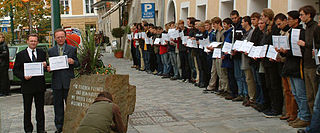
The House of Responsibility (HRB) in Braunau am Inn is the idea of establishing an international meeting place and a place of learning in the birth house of Adolf Hitler. People from all countries, backgrounds, religions and cultures should meet in order to discuss, learn and develop projects revolving around the concept of responsibility relating to the dimensions of past, present and future. The main demography shall be young people. The idea for a House of Responsibility originates from the founder of the Gedenkdienst and chairman of the Austrian Service Abroad Dr. Andreas Maislinger.

The Trapp Family was a singing group formed from the family of former Austrian naval commander Georg von Trapp. The family achieved fame in their original singing career in their native Austria during the interwar period. They also performed in the United States before emigrating there permanently to escape the deteriorating situation in Austria leading up to World War II. In the United States, they became well known as the "Trapp Family Singers" until they ceased to perform as a unit in 1957. The family's story later served as the basis for a memoir, two German films, and the Rodgers and Hammerstein Broadway musical The Sound of Music. The last surviving of the original seven, Maria Franziska, died in 2014 at the age of 99. The youngest and last surviving member of the Trapp Family Singers is Johannes von Trapp.
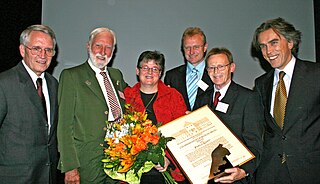
Gerhard Skiba was a politician of the Austrian Social Democratic Party elected mayor of the city of Braunau am Inn in 1989. He became internationally known after setting up a memorial stone for the victims of Fascism in front of the house where Adolf Hitler was born.
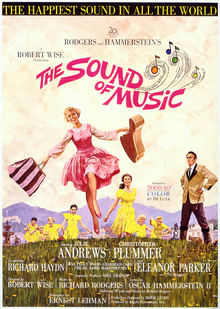
The Sound of Music is a 1965 American musical drama film produced and directed by Robert Wise from a screenplay written by Ernest Lehman, and starring Julie Andrews and Christopher Plummer, with Richard Haydn, Peggy Wood, Charmian Carr, and Eleanor Parker. The film is an adaptation of the 1959 stage musical composed by Richard Rodgers, with lyrics by Oscar Hammerstein II and a book by Lindsay and Crouse. It is based on the 1949 memoir The Story of the Trapp Family Singers by Maria von Trapp and is set in Salzburg, Austria. It is a fictional retelling of her experiences as governess to seven children, her eventual marriage with their father Captain Georg von Trapp, and their escape during the Anschluss in 1938.
Bezirk Braunau is a district of the state of Upper Austria in Austria.
Trapp is a surname. Notable people with the surname include:
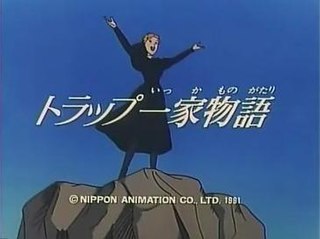
Trapp Family Story is a 1991 Japanese animated series by Nippon Animation, based on the story of the real-life Austrian singing family the Trapp Family. It is a part of the World Masterpiece Theatre franchise, which adapted classic works of literature into animated TV shows. 40 episodes aired on Fuji TV.

Maria Agatha Franziska Gobertina von Trapp was the second-oldest daughter of Georg von Trapp and his first wife, Agathe Whitehead von Trapp. She was a member of the Trapp Family Singers, whose lives inspired the musical and film The Sound of Music. She was portrayed by Heather Menzies as the character "Louisa". She died at age 99, and was the last surviving sibling portrayed in the film.
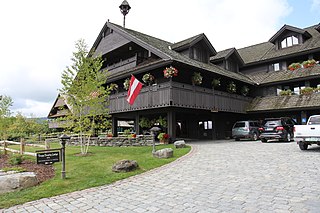
The Trapp Family Lodge is a 2,500-acre (10 km2) resort located in Stowe, Vermont. It is managed by Sam von Trapp, son of Johannes von Trapp of the Austrian musical family, the Trapps. It was formerly known as Cor Unum.

Ernst Florian Winter was an American historian and political scientist, the first director of the Diplomatic Academy of Vienna after World War II, and chairman of the International Council of the Austrian Service Abroad.
The Braunau Contemporary History Days are a series of conferences organised by the Association for Contemporary History. Scientifically guided by Andreas Maislinger, it has annually taken place in Braunau am Inn since 1992.
Johannes von Trapp is an American Austrian singer and former member of the Trapp Family Singers, whose lives were the inspiration for the musical and movie The Sound of Music. He is the tenth and youngest child. As of September 2023, Johannes is the last surviving sibling of the von Trapp family.
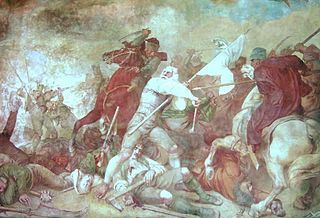
The Bavarian uprising of 1705–1706 was a revolt against the occupation of the Electorate of Bavaria by the Imperial Army of the Habsburg Monarchy during the War of the Spanish Succession (1701–1714). It lasted from early November 1705 to 18 January 1706, approximately 75 days. Henric L. Wuermeling speaks of this as "the first revolution of modern history."

The Egon Ranshofen-Wertheimer Award was founded by the city of Braunau am Inn in cooperation with the Society for Contemporary History.

Agathe Gobertina von Trapp was a British-Austrian heiress and aristocrat. She was the first wife of Georg Ritter von Trapp and the mother of seven children of the Trapp Family singers.